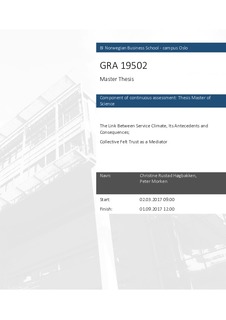The link between service climate, its antecedents and consequences : collective felt trust as a mediator
Master thesis
Permanent lenke
http://hdl.handle.net/11250/2483556Utgivelsesdato
2017Metadata
Vis full innførselSamlinger
- Master of Science [1621]
Sammendrag
Based on previous literature, it is evident that organizational resources and
leadership behavior influence employees’ positive perception of a service climate,
which subsequently leads to improved unit performance. Still, researchers stress the
need to explore this relationship in combination with other possible mediators to
understand the underlying mechanisms. Very little attention is previously given to
the effect of collective felt trust, although felt trust is considered critical for a unit
to function well. The aim of this study was to explore the relationship between
collective felt trust and service climate, by proposing collective felt trust as a
mediator between service climate and two of its antecedents; organizational
resources and leadership. We built on LMX theory, and aimed at exploring the
relationship between leadership and service climate by looking at both the
economic and social component (i.e. SLMX and ELMX). A cross-sectional survey
of 238 employees among 48 units revealed that collective felt trust mediates the
relationship between organizational resources and service climate, and we found a
positive relationship between collective felt trust and unit performance. As a
consequence of a high correlation between SLMX and collective felt trust, the
relationship between SLMX, collective felt trust, and service climate was not
explored. However, preliminary results show that SLMX and service climate was
strongly related. There was no support for collective felt trust as a mediator between
ELMX and service climate, and ELMX did not have a significant effect on neither
collective felt trust nor service climate. Also, service climate was not significantly
related to unit performance. The study implies that important predictors for service
climate are SLMX and organizational resources, and felt trust among employees
can explain why accessibility to resources can lead to a positive perception of a
service climate.
Keywords: service climate, organizational resources, social leader-member
exchange, economic leader-member exchange, collective felt trust, unit
performance, structural equation model
Beskrivelse
Masteroppgave(MSc) in Master of Science in Business, Leadership and Change - Handelshøyskolen BI, 2017
